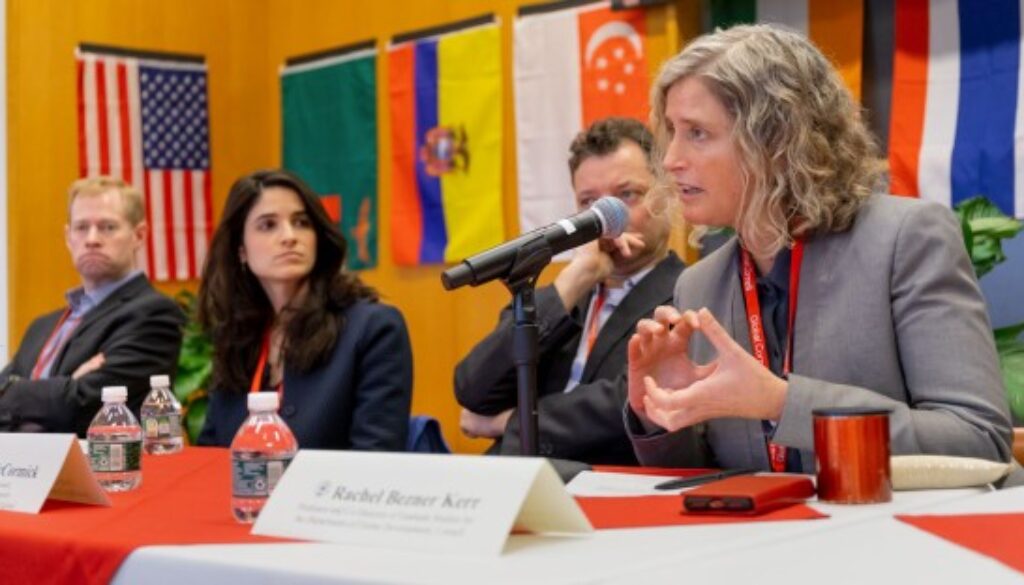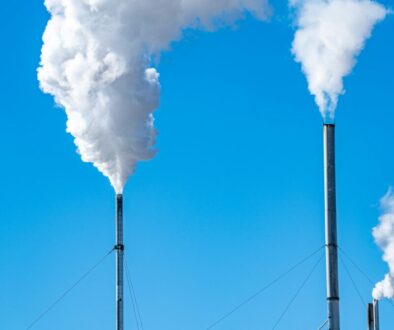Interview: “Transformational change” is needed as severe climate change impacts loom
By Pam Strayer
Last month, Cornell University professor Rachel Bezner Kerr traveled to Egypt where she addressed scientists and political leaders gathered from around the world at the 27th Conference of the Parties to the United Nations Framework Convention on Climate Change (COP 27).
Bezner Kerr is a co-director of graduate studies for Cornell’s Department of Global Development and one of the three lead coordinating authors of a chapter about food, fiber and “other ecosystem products” for the United Nations Intergovernmental Panel on Climate Change (IPCC) report. Bezner Kerr believes that time is running out when it comes to options for preventing severe climate change impacts on people and nature.
Among her observations, Bezner Kerr is calling for a systemic transformation across the agricultural industry, which is responsible for approximately 33% of carbon emissions, including those associated with nitrogen-based fertilizers.
The New Lede (TNL) spoke with Bezner Kerr upon her return from COP 27 about her views on how and why a food system transformation is needed for climate resilience. The following is an edited and condensed account of the conversation:
TNL: When we think of climate change, why do we also need to think about a sweeping change to our current agricultural system?

Bezner Kerr: That is a key message coming out of the IPCC report–that we need transformational change and for multiple reasons. One, in terms of the food system, right now the way we produce food is heavily reliant on fossil fuels. It’s not something that you can just address one component and then your food system is set.
If you are addressing reducing the use of synthetic fertilizers, for example, then you may need to shift diets to accommodate the shift in yields that may accompany that transition to organic production. Or you may also have challenges with different pests and diseases because you’ve become reliant on synthetic pesticides.
And so you may need to incorporate more diversified production systems, which means a really different kind of market and subsidy environment to be able to support that. And, in addition, the way we currently produce food doesn’t just have greenhouse gas emission impacts, it has very significant negative impacts on biodiversity and on water pollution. And it also doesn’t really work for most farmers in terms of supporting livelihoods. Most farmers have a negative livelihood, unless they get support from subsidy programs. And so in order to help farmers transition to a different system, that means transforming the subsidy program.
It’s going to require an overarching transformation to the food system and not just piecemeal changes.
TNL: What is one specific step you recommend?
Bezner Kerr: I think one of the key steps would be diverting subsidies which currently go towards growing corn, soy and other big commodity crops to funding more diversified production–ecological farming, using methods such as cover crops and intercropping. That would probably be one of the starting points.
A number of countries have had a lot of success with public procurement strategies, whereby school lunches and other institutions that are buying large amounts of food are encouraged to buy through different subsidy programs and through regulations in which they’re encouraged to buy these more diversified foods from local and regional producers using these ecological farming methods. So that’s another kind of kickstart for farmers to motivate making this transition. You’d also need support for training and capacity-building in these methods. There are a number of institutions around the country that have knowledge in this area and could be provided with support for them to really roll that out. Those would probably be some of the starting points
TNL: In the United States there appears to be growing enthusiasm for regenerative agriculture. How would you say those efforts rate?
Bezner Kerr: I think regenerative agriculture is a relatively new term in the scientific literature and what it means varies a lot. I think if you’re talking about shifting farmers away from reliance on synthetic fossil fuel-based fertilizer, and building in practices that build soil health, I think that’s important. But I think that our assessment in the report calls for much more than just attention to soil health, and much of regenerative agriculture seems to be focused on that component, not on other dimensions of the way we produce food that is problematic.
For instance, it often doesn’t get into questions of unequal power dynamics. That is part of the big picture for transforming the food system. Right now we have a food system where we have a few companies that sell inputs for farmers to rely on (to grow food) and retailers that sell the food products. Transitioning the food system to one that’s more sustainable, and one that provides reasonable livelihoods for farmers, while also providing affordable food means having a wider range of companies both on the input side and on the retail side. And regenerative agriculture doesn’t really get at that aspect.
So a lot of the really big companies are touting that they are transitioning to regenerative agriculture. I think that signals that it’s not going to be a complete transformation of the food system, if it is the way it’s currently being described.
TNL: How is climate change expected to affect the use of pesticides?
Bezner Kerr: This is an under-researched area, but what research has come out has indicated that the efficacy of pesticides is likely to decline with rising temperatures, which means that you may get increased use, because you have to use more for effectiveness. People may have to switch to more toxic pesticides because efficacy is going down. High use of pesticides is already known to have a biodiversity impact, and biodiversity is really crucial for sustaining a resilient food system.
This points to the need to try to transition away from reliance on synthetic pesticides that are toxic and towards more ecological approaches to food production that use things like intercropping and diversification of landscapes and other strategies to reduce pest and disease loss.
TNL: How can pesticide use be cut in the short term?
Bezner Kerr: Farmers can make a transition to organic production. It takes more knowledge and time. It’s not something that you can do overnight. But it’s absolutely possible to do and get decent yields. But it means a very different kind of production system. it would require time to make that transition.
The literature shows that it can be more profitable. It can certainly support livelihoods. The policy regime makes a difference. So if the government is pouring all of its support into monoculture and conventional farming, then it’s harder for farmers to compete with that because they’re essentially competing with cheap, cheaper produced goods because of those subsidies.
TNL: You’ve worked a lot over the past 20 years in Malawi and Tanzania. What would be your observations for those countries?
Bezner Kerr: Interestingly, it wouldn’t be that different because right now, in Malawi, the majority–something like 70% to 80% – of the ministry of agriculture’s budget goes towards nitrogen fertilizer and hybrid maize seed subsidies. That’s an enormous amount of money for a very poor country to pour into purchasing an input from abroad, which still hasn’t reduced food insecurity in the country.
The country is currently facing a financial crisis because of the rising cost of fuel and fertilizer and not really being able to afford that for the majority of their smallholder farmers anymore. So they’ve announced that they’re planning to move away from the fertilizer subsidy within five years from now.
In many countries, they aren’t as far along in their industrialization of agriculture. So it might not be as disruptive a transition… might be easier to roll out in some ways, because you don’t have entire systems set up with vast monocultures and very large firms designed around that model. But because they have fewer resources, there would be many, many more challenges as well.
TNL: If you were creating the plan to migrate to a climate smarter, more resilient systems, what are the three things that you would prioritize?
Bezner Kerr: The word I would use is agroecological–that’s really the term–because climate smart tends to be focused more mostly on the mitigation side.
So my priorities would include diverting subsidies towards diversified production, really supporting small and midsize producers and making that transition first, because I think that would be an easier lift, and they also get very few of the subsidies. I think that would make a big difference. And then something around consumption, so, supporting the market side of diversified production could be really crucial, which could be public procurement. It could be wide scale, innovative healthy eating programs that really build on what what’s known in the literature, but really hasn’t been tried out on a large scale. It would really support food for low-income households that is healthy and diversified, eco-friendly food.
(Featured photo by Simon Wheeler for Cornell University.)
 EWG
EWG


